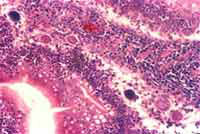
Introduction
 |
| Coccidia are parasites that damage the gut of poultry. |
In the past, coccidiosis was one of the diseases most feared by commercial poultry growers in the U.S. Death losses of 20 percent or more were common. “Backyard” growers are usually so small that coccidiosis is not a problem, but as the size of free-range flocks increases, coccidiosis becomes a threat.
Small producers in the U.S. raise birds with outdoor access and sell the meat and eggs directly to local consumers. These “pastured poultry” flocks are increasing in number and size. Many of these producers use natural production methods and avoid using drugs in their flocks. Larger companies also produce certified organic poultry under the USDA National Organic Program rules, which do not permit the use of anticoccidial drugs.
The conventional poultry industry is likewise interested in reducing its reliance on drugs. The industry raises poultry on a large scale with high-density flocks. Coccidiosis is controlled with preventative drugs. In fact, high-density production became possible only after the development of preventative anticoccidial drugs in the 1940s. However, coccidia are becoming increasingly resistant to drugs, and the poultry industry is looking for alternatives. The use of vaccines in particular holds potential for both small and large growers.
Coccidiosis is a parasitic disease that can cause severe losses in poultry meat and egg production. The parasites multiply in the intestines and cause tissue damage, lowered feed intake, poor absorption of nutrients from the feed, dehydration, and blood loss. Birds are also more likely to get sick from secondary bacterial infections. However, in low-density production or with the use of preventative medication, coccidiosis generally remains a subclinical disease that only affects performance – without the alarming losses of the past.
Producers used to dread outbreaks of bloody diarrhea. An outbreak of coccidiosis left untreated, eventually runs its course, and most of the flock will survive. The birds that recover from coccidiosis gain immunity, but production may never recover. If the infection is severe, the gut remains scarred and impaired, and stunted broilers do not catch up in weight gain.
The production system and the stocking density have a significant impact on coccidiosis. Low-density production systems allow a low level of exposure in which immunity develops without making the birds sick and damaging performance. Birds are then protected. However, as the size of flocks increase, the numbers of coccidia also grow and can pose a threat to the flock.
Copyright © NCAT 1997-2007. All Rights Reserved.


 © 2000 - 2021. Global Ag MediaNinguna parte de este sitio puede ser reproducida sin previa autorización.
© 2000 - 2021. Global Ag MediaNinguna parte de este sitio puede ser reproducida sin previa autorización.